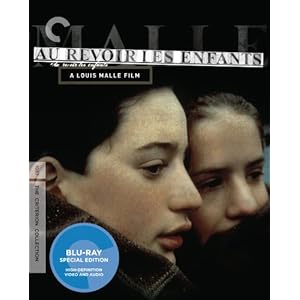

For decades, the great French filmmaker Louis Malle resisted mining his most haunting memory for its cinematic potential. Emboldened over time by the semi-autobiographical Murmur of the Heart (1971) and Occupation-era Lacombe, Lucien (1974), Malle determined to tell the story he would have to end with the heart-rending line "More than forty years have passed, but I'll remember every second of that January morning until the day I die." The film, an international success, ironically became Malle's most famous: Au revoir, les enfants (Goodbye, Children).
The January morning in question comes in 1944, partway through the term of the boarding school on the grounds of the St. John of the Cross Carmelite Convent. Even in peacetime, the separation of boys from their parents would be a bitter parting, but in wartime, the school promises a particularly hard-scrabble existence: freezing, starving (even a communion fast is in effect), and air raids—the intrusion of war, when it comes, is always swift and terrible. Despite the monks' encouragement to share food from home, the school also has its own burgeoning black market, ringled by put-upon kitchen worker Joseph (François Négret).
Self-satisfied twelve-year-old Julien Quentin (Gaspard Manesse) reserves his drama for his mother ("I don't give a damn about Dad, and I hate you," he says, before grasping his mother in a farewell embrace), but wields his intellect and sarcasm to establish primacy amongst his peers. In truth, Julien's bravado masks his personal and global uncertainties and the terrible self-admission that he doesn't yet know everything. In Nazi-occupied France, anti-Semitism is casual and overt even amongst the children, but Julien's growing suspicion that new-boy Jean Bonnet (Raphaël Fejtö) may be Jewish piques Julien's interest.
If nothing else, class difference conspires to separate the comfortable Quentin from the orphaned Bonnet. Malle unsentimentally depicts the boys' slow bonding, led by Quentin's progressive cruelty, curiosity, and grudging affection. The boys take notice of each other: Julien's bed-wetting, Jean's disappearing acts with the school's powers-that-be, and a mutual love of literature (breathlessly, the boys huddle to read The Arabian Nights). The two face a brush with danger when they become lost and abandoned during a competitive treasure-hunt excursion.
Writer-director Malle affects his trademark moral ambiguity by depicting a couple of German soldiers as humane and the French collaborators as cold-blooded; likewise, the Catholic monks of Au revoir les enfants enjoy a nobility Malle doesn't typically afford the clergy. As ever, Malle's sensitivity is supreme and his delicate style evocative (credit the photography to Renato Berta). The superb acting accordingly shows attention to detail (like Fejtö's Bonnet beaming at Mrs. Quentin), with the especially fine work of the child leads paying huge emotional dividends in Malle's wrenching conclusion.
Dramatic necessity required Malle to magnify the relationship between himself—as represented by Quentin—and the real-life equivalent of Bonnet, but as in Murmur of the Heart, the director's young stand-in is no angel. As such, the audience can more richly share in the character's crushing defeats and deceptively small victories. When Julien succeeds in emerging from his own solipsism to accept the horrors and wonders of life outside his home, coming-of-age proves the greatest victory of all: every second to follow that January morning would be a gift of hope in the future.

|
|
 |
Criterion's edition of Au revoir les enfants hits Blu-ray (while remaining available on DVD as part of the 3 Films By Louis Malle box set). The film has never looked better on home video than it does on Blu-ray—the high-def transfer was supervised by cinematographer Renato Berta. Struck for the standard-def release, the transfer looks significantly more detailed on Blu-ray, especially in the much-improved shadow detail and the richness of the color. The mono soundtrack is well-preserved, and the updated subtitles well represent Malle's script.
"Pierre Billard on Louis Malle" (30:40, HD) sits Malle acquaintance and biographer Billard to discuss the intersection of the filmmaker's life and work (particularly Malle's rebellion, spirit of discovery, artistic ambiguity, and controversial role in French cinema). "Candice Bergen" (13:31, HD) finds the late director's wife reflect on her husband's art, work ethic, and personality (Bergen focuses on the Au revoir les enfants period, recalling a set visit she made and the awards-circuit roller coaster).
From the archives of the American Film Institute comes an invaluable recordings: AFI's 1988 Harold Lloyd Master Seminar with Malle (53:06, HD). Also showcased is the complete 1917 Charlie Chaplin short "The Immigrant" (25:11, HD)—seen, in part, in Au revoir les enfants (the version here is a Kino print with a lackluster Michael Mortilla score). Also here is a 2005 short film, "The Character of Joseph as seen by Guy Magen" (5:20, HD). A critical film essay in film form, Magen's piece sagely explicates the key supporting character from Au revoir les enfants.
The single disc includes a "Teaser Trailer" (0:44, HD) and original "Theatrical Trailer" (1:58, HD), and a twenty-four-page booklet features the Philip Kemp piece "Childhood's End" (adapted from its original form in Sight & Sound) and French-history essay "Père Jacques and the Petit-Collège D'Avon," by Francis J. Murphy.
 |
||
 |